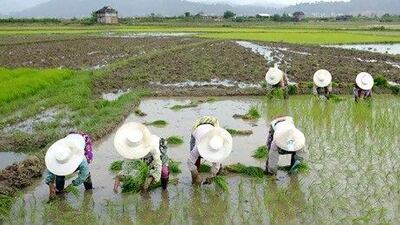Mountains sit to one side and neat rows of trees stretch in all directions in this tranquil part of Beijing Municipality a couple of hours' drive north of the city itself.
Yu Lin Tang Quan Orchards, a farm producing cherries, strawberries, apples, pears and dates, may not be quite the rural idyll, as even here there is a haze of smog, but the setting nonetheless offers a break from the capital's traffic and faceless tower blocks.
No wonder two young Chinese entrepreneurs have chosen this farm to begin what they hope will be long and productive careers in agriculture.
Feng Te and Li Ce, both 22 and from just outside the city of Shijiazhuang south of Beijing, believe farming and its related industries offer better prospects than the urban rat-race.
"The good thing about working on a farm is that the environment is good. It's outdoors, it's free. It teaches you useful skills," says Mr Feng, who joined the farm several months ago. "The pay starts low but as we learn more skills and knowledge, I believe the farm will raise our salaries."
At the moment, Mr Feng and Mr Li cultivate strawberries in the farm's dozens of greenhouses. They also learn techniques such as how to prune Chinese date trees to maximise fruit production.
"I'm from a peasant family and I like working outdoors. I enjoy the fresh air," says Mr Li, who along with his fellow trainee is studying at Beijing University of Agriculture as well as working at the farm. Monthly salaries at the farm begin at about 2,000 yuan (Dh1,164).
Nationally, the number of people working in agriculture continues to fall rapidly, as 13 million people move to the cities annually.
In 1990, 55 per cent of China's workforce was employed in agriculture. Two decades later the figure was 33 per cent and by 2020, just a quarter of employment will be in farming.
During 2007 alone, the agricultural workforce shrunk by 11.2 million, while there was an increase of 17.1 million in the tally of non-farm employees.
The trend will continue, with China's approximate total of 300 million working in agriculture still more than 100 times that of Japan, which has a population about one tenth the size of China's.
Yet although China's manufacturing, service and other sectors have grown, the country's agricultural output is still bigger than that of any other country.
With eight per cent of the world's arable land, China feeds nearly a fifth of the world's population, and agricultural exports have grown 13.2 per cent over the past decade.
For the key staples of rice, wheat and corn, China is more than 98 per cent self-sufficient. Total production of these rose from 220 million tonnes in 1975 to 480 million tonnes in 2010.
Career opportunities are diversifying as small plots previously managed by peasants are amalgamated.
"China's agriculture has developed into agribusiness," says Wang Yuzhu, Yu Lin Tang Quan Orchards' deputy general manager.
"It's no longer just smallhold farms where you take enough to support yourself. It's big companies operating these farms. It offers career prospects to young students. That's why they're coming here."
Set up in 2005 on land previously farmed by peasants, the farm has a restaurant, guest house, fishing pond and other leisure-related businesses to attract Beijingers keen for a weekend in the countryside. Visitors pick their own produce.
The farm has technological collaborations for strawberry production with several organisations and research centres based in Spain.
These more sophisticated farms attract ambitious youngsters who realise agriculture offers more than hours of repetitive, back-breaking labour. Agricultural research also offers opportunities.
"The government still considers agriculture as a basis for this country's development ... so they are enhancing research and development in agricultural technology," says Zhao Longhua, 24, who is studying for a master's degree in soil science at China Agricultural University in Beijing.
Ms Zhao, who comes from Gansu province in central China, grew up in a city, although many others entering the sector have rural backgrounds. Chen Xiaochao, 24, also a postgraduate at China Agricultural University, is the daughter of farmers in Anhui province in eastern China.
"I am from a rural area and back in my home village the productivity of farmers is very low. That's why I chose to study agriculture, to help these people out," says Ms Chen, who is specialising in plant nutrition.
"These smallholdings are being combined into big farms, where big business will take over and change them into farming factories. That requires technology and expertise. That's why I think I will have better prospects."
Yet, for all the transformation sweeping China's agricultural sector, prejudices remain. In many communities, farming is still seen as an impoverished existence to escape from.
"A lot of children from the rural areas, they've been taught they have to leave the fields to make a better living, so they won't choose agriculture," says Yang Miyi, 23, from central China's Shaanxi province.
Indeed, the fourth-year undergraduate at China Agricultural University says most people view agriculture as a "cold subject" with few opportunities. There is "this bias against agriculture".
"We think people working in the fields are beneath wage earners. But I don't have this bias, so I think agriculture is important and I can make a difference," she says.
To ensure they retain staff, farms have to take account of the young people's growing expectations. The staff dormitories at Yu Lin Tang Quan have wireless internet access and television and Mr Wang says efforts are made to ensure motivation among young workers remains high.
"They don't like to do the farmwork all the time. They get bored. They always ask: 'Why am I doing this?' It can be very mechanical, which is not interesting," he says.
"You have to manage them well. When they get bored you change their duties, ask them to do something else. We try our best to interest them, not let them get bored. It does work."


